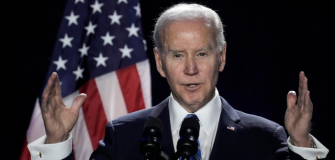Would a New York prosecution of Donald Trump be fair?
Share
Former President Donald Trump says that he will be arrested on Tuesday. Trump called on his supporters to rally to his defense and “to take back the country.”
Trump is referencing media reports which suggest that a Manhattan, New York City grand jury will issue an indictment against Trump sometime this week. The basis of the indictment would be alleged “hush money” paid to Stormy Daniels, a former pornographic actress.
Manhattan district attorney Alvin L. Bragg apparently will assert that Trump paid $130,000 to Daniels to buy her silence about an affair between the two of them. The intermediary for the alleged payoff was Trump’s former attorney, Michael D. Cohen. In addition, Bragg will assert that the payoff was falsely accounted for in Trump Organization’s financial statements. Bragg reportedly will argue that the $130,000 payment violated campaign laws.
If the indictment is issued, it could be the first time in the history of the United States that a former President is arrested on charges of a felony offense. A tawdry and relatively trivial payment will be the basis for a criminal indictment. But what are the broader legal and political questions involved?
Harvard Law School professor emeritus Alan Dershowitz says that an indictment would be a “targeted” prosecution. The U.S. criminal justice system will certainly be on trial if Trump is indeed arrested and tried. Bragg will use the fig leaf of a grand jury indictment to obfuscate his true motives: a progressive vendetta against Trump and publicity for future political campaigns for higher office.
In English Common Law, the purpose of the grand jury was to protect the public against the abuse of power by the state. That purpose was reaffirmed by the U.S. Supreme Court in the 1992 case of United States v. Williams. In practice, however, the history of the grand jury is replete with examples of its use to pursue narrow political goals, not justice.
In a grand jury proceeding, the prosecutor — the hidden power in the criminal justice system — presents all the evidence. The prosecutor decides whether exculpatory evidence will be introduced or not. In a grand jury, the person or persons being investigated are not allowed defense counsel. Some experts say that the current grand jury system is an unfair and biased system.
Certainly, the public should raise an eyebrow that a former President is being indicted by a New York City grand jury. And not, that is to say, by a Federal prosecutor. The public should also be outraged that the basis of the claim of hush money payment is by a convicted felon, Michael Cohen. The testimony of an ex-felon should be subject to cross-examination.
That did not happen. If Trump is arrested, then the prosecution will not pass the common law view of justice as fair and balanced rather than arbitrary and biased. Every accused, regardless of notoriety, is entitled to justice. But Trump’s call to his supporters “to take back the country” ill serves the nation and undermines the rule of law.













